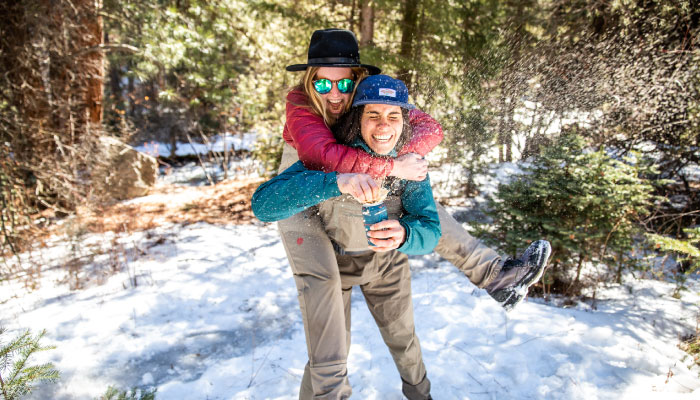With the goal of becoming the “beverage of the outdoor industry,” Wild Barn Coffee co-founders Jenny Verocchi and Alyssa Evans are offering consumers a functional twist on their typical on-the-go caffeine fix with superfood-infused nitro cold brew. With cheeky branding, sustainably sourced ingredients and a message of female empowerment, the duo aims to provide a better-for-you beverage for adventure-seeking, health-conscious coffee drinkers.
Verocchi has coffee in her blood: her parents, Mark and Lisa Verrochi, are the founders and owners of Massachusetts-based Red Barn Coffee, a roaster and multi-location retailer which was founded in 1997 and sells both beans and ready-to-drink nitro cold brew. After growing up working at her family’s cafes, Verocchi moved to Boulder, Colorado and began experimenting with infusing coffee with superfoods. Rather than open a cafe, she decided to team up with Evans, a longtime friend and CPG packaging designer, to launch a packaged product for outdoor enthusiasts.
“I learned from some of my parents’ mistakes and saw some of their hardships,” Verrochi said. “I just wanted something that could support my lifestyle. I like to travel and I like to be outdoors, so having a product was my way of doing that.”
Verocchi and Evans launched the single-SKU nitro cold brew coffee line — made with organic black coffee, goji berries and cacao nibs and containing 240 mg of caffeine per 12 oz. can — as Backcountry Nitro in March 2019. However, due to trademark issues, they changed the brand’s name to Wild Barn Coffee last winter as a nod to Verocchi’s roots.
“It’s just a nice combination, because I feel like we’re the little sisters or the daughters to Red Barn Coffee, just painting with our own colors,” Verrochi said.
Evans, who has worked on packaging for brands including Silk, STOK Cold Brew and Horizon Organic, wanted to capture the co-founders’ love of the outdoors as well as its focus on female empowerment with its branding. Verrochi said Evans’ “nudie skier” design has been essential in catching consumers’ eyes on a crowded canned nitro cold brew shelf while also serving as a selling point for those unfamiliar with the category.
“My dad, who owns his own nitro company, has always said there’s no such thing as bad competition,” Verrochi said. “If something else comes out, it’s educating the market. And there’s a place for everybody.”
Wild Barn sources organic beans from Cafe Solar, a sustainable female-owned and operated farm in Honduras which also partners with Red Barn. The beans are processed in a carbon neutral facility which uses solar energy and biofuel. Verrochi said sustainability is a core part of the brand’s mission as she and Evans aim to raise awareness about the negative environmental impacts of coffee plantations, such as deforestation.
Verrochi said she believes Wild Barn appeals to a “new generation” of coffee drinkers who are “more aware of what they’re putting into their bodies” and “very health conscious.” These consumers are also more open to supporting female-owned, environmentally conscious businesses.
“People want to see more diversity in the boardroom, the office and the outdoors,” Verrochi said.
Evans said any potential future Wild Barn products will always be organic, plant-based and sugar-free and she sees the brand extending “in a few different realms of the coffee world.” The company’s next offering is medium roast whole bean coffee, launching in the next few weeks. While they’ve also decided on their next two RTD launches — a lavender vanilla oat milk latte and a dirty chai latte — Verrochi said they’ll wait until they secure investment before bringing these products to market. Since raising $30,000 through a Kickstarter campaign in 2018, the business has been self-funded.
Wild Barn is currently available at a handful of local Boulder accounts including Lucky’s Market and Alfalfa’s Market. Ski destination Eldora Mountain Resort was the brand’s largest account prior to COVID-19. Like many brands, Wild Barn pivoted online when the pandemic hit, and is currently offering 6-packs ($21) and 12-packs ($42) with the goal to expand to 20 or 24-packs with a subscription option.
Despite COVID-19’s effect on sales and marketing opportunities, Verrochi and Evans have found a support system among the community of food and beverage startups in the Boulder area. Verrochi noted she oftens goes rock climbing and mountain biking with local entrepreneurs, including owners of coffee companies Alpine Start and Carabiner Coffee, to talk about possible collaborations.
“If we’re ever having a bad day we can call anybody who started a company in Boulder,” Verrochi said. “We’ll sit down and we’ll just laugh and cry about it and then come up with a solution.”

